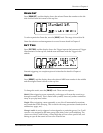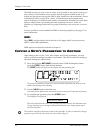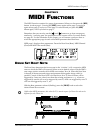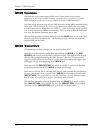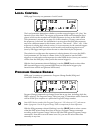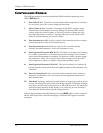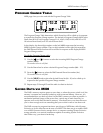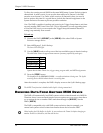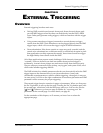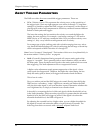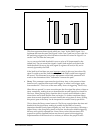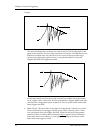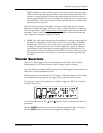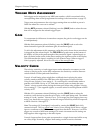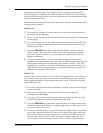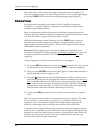
External Triggering: Chapter 6
DM5 Reference Manual 39
CHAPTER 6
EXTERNAL TRIGGERING
OVERVIEW
External triggering has three main uses:
• Driving DM5 sounds from electronic drum pads. Some electronic drum pads
provide MIDI triggers when hit; these can feed directly into the DM5’s MIDI
input. Other pads generate analog triggers, which can interface with the trigger
inputs.
• Using contact transducers (triggers) mounted on acoustic drums to trigger
sounds from the DM5. These transducers can be plugged directly into the DM5
trigger input, which will convert the trigger's signal to MIDI information.
• Drum substitution. If the drum sounds on a tape are poorly recorded, and the
sounds to be substituted are on different tracks (or sufficiently far apart in pitch
that equalization can help separate the sounds), these drum sounds can trigger
the high-fidelity drum sounds inside the DM5.
All of these applications present certain challenges. With electronic drum pads,
“crosstalk” from one drum hit can leak into another drum pad and trigger it
accidentally. Acoustic drum pickups are much more finicky than electronic pads.
They are subject to extraneous Noise pickup, varying gain, and system Noise, all of
which make reliable triggering difficult.
The DM5 includes five editable parameters that let you electronically tailor the DM5
trigger inputs to the characteristics of your drum transducers. It may take
considerable experimentation to achieve reliable triggering…then again, it may not.
At some point, you’ll hit on the right combination of transducer placement and DM5
parameter values necessary for proper triggering.
The external trigger function contains six pages of parameters. When you first press
the Ext Trig button, it calls up the first page. Pressing the Ext Trig button again calls
the second page, a third time calls the third page, and so on. You can also use the
[ ] and [ ] buttons to go from one page to another by “cursoring past” the
parameters on the current page. For more details, see page 26.
For the remainder of this chapter, we’ll assume you know how to select the
appropriate page.



